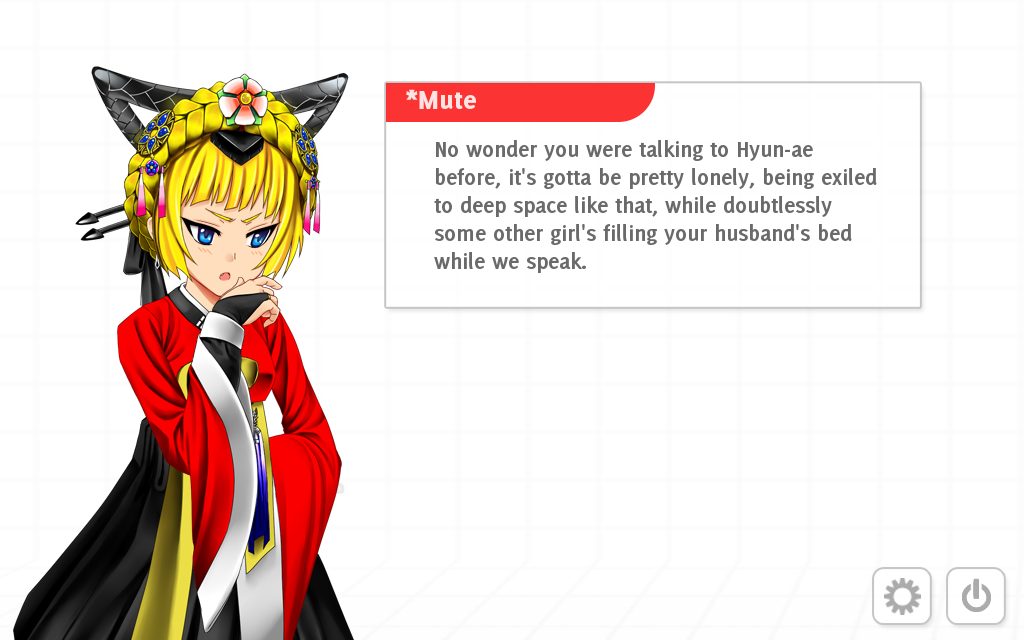Analogue: A Hate Story (PC/Mac)

On the most basic level, Analogue: A Hate Story is a visual novel, the kind normally filled with attractive anime-inspired characters and the promise of romantic entanglements. It’s much more than that, though, which isn’t a surprise, as it’s from the same developer as Don’t Take It Personally, Babe, It’s Just Ain’t Your Story, a game that offered a chilling look at how social media could be used to compromise privacy.
If I had to describe Analogue in three words or less, I would tell you it’s an uncomfortably intimate experience. If you asked me how it affected me as a person, I would tell you how awestruck I am by how a white Canadian developer, separated by genetics, geography and upbringing, could so perfectly capture what it can be like to be an Asian female. Set within the half-forgotten logs and personal missives of a ship’s long-dead crew, the same vessel you are charged to investigate at the beginning of the game, Analogue is a story of ghosts, filial loyalty, desperation, anachronistic gender roles and the worst kind of hate possible: self-hate.
There’s a lot of that last one in Analogue. Self-loathing permeates almost everything you read. You see it in the diary of a woman named the Pale Bride, in your exchanges with the ship’s artificial intelligences, in the words of a son looking to redeem his family and how a wife struggles with illicit affections. It’s everywhere. And for someone who was raised in a traditional South-East Asian environment, it’s also disturbingly familiar.
I remember growing up with a constant sense of guilt. I didn’t learn how to cook till I was in my teens. I wasn’t adept at laundry. I spoke too loudly and played too many videogames. I wasn’t feminine enough. I would never be accepted by my hypothetical mother-in-law. One of my earliest memories is of myself as a little girl, sitting frozen in the backseat of a car, afraid that I would be beaten bloody again because I had, at a family gathering, accidentally spilled a glass of tea. I remember whimpering to my father, telling him that I had only made that one mistake, that I would never shame him again if he would only spare me. I think I was five.
For the longest time, I led my life like the characters in Analogue. It is an unsettling reminder of what I left behind.
That said, I doubt Analogue would have made such an impact if creator Christine Love’s writing wasn’t quite so stellar. While a vast majority of the cast exists as nothing but a collection of transcripts, it is easy to put a face to the letters and to picture the events that once transpired on that ill-fated ship. Love’s narrative skills are also why Analogue can feel so uncomfortably intimate. You aren’t reading mere records. You’re intruding on the dead. The things you uncover were often kept secret by these people for their whole lives, secrets they would have killed to protect. However, six hundred years later, they can do nothing. Silent and impotent, they’re incapable of protesting as you cross-examine their transgressions and their vices, their moments of vulnerability. More than once, I felt the urge to power down the game apologetically, unwilling to rob the deceased of even more of their secrets.

Analogue is festooned with such familiar conceits (you see these things a lot in Chinese dramas) as arranged marriages, displaced wives, bickering clans and “that-one-girl-that-changes-everything”. In this case, the subject in question is the Pale Bride, an adolescent ripped from cryo-stasis to serve as an unwilling spouse. While a fair bit of the story revolves around her arrival in this cloistered world, she isn’t really the focal point. No one is. Even your only companions in this otherwise lonely excursion, two A.I.s, are only playing the roles that have been given to them.